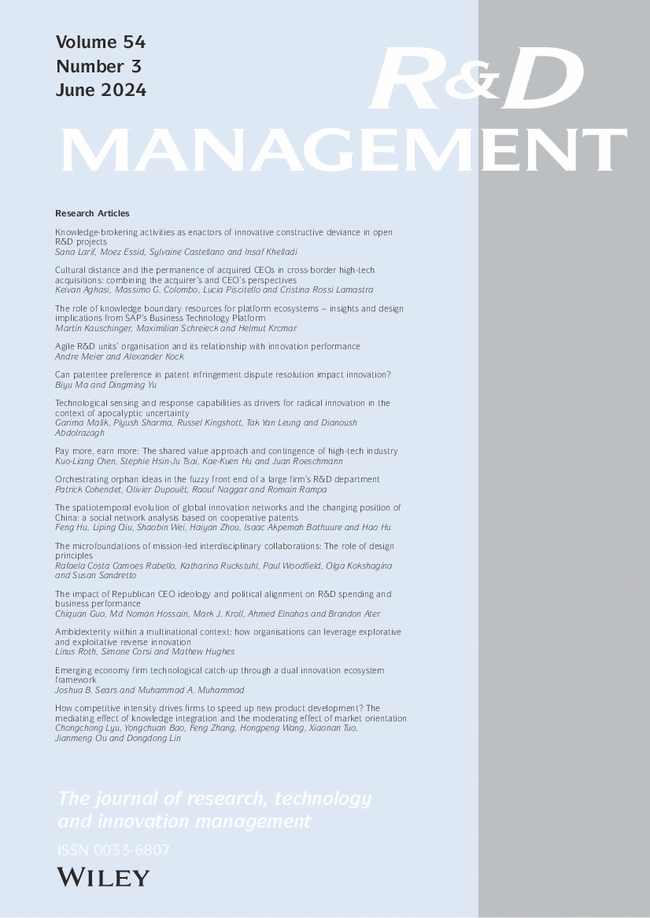Engaging with startups through corporate accelerators: the case of H‐FARM's White Label Accelerator
IF 5.7
2区 管理学
Q1 BUSINESS
引用次数: 0
Abstract
Corporate accelerators have emerged in recent years as an innovation mechanism that builds bridges between corporations and startups. Through inbound Open Innovation (OI) activities, established firms open their innovation processes to startups to acquire their knowledge. Previous research has focused either on independent accelerators or on corporate accelerator programs that an established firm operates internally. The literature on how accelerators orchestrate different OI practices is sparse, yet large corporations are forging ahead with corporate accelerators. Furthermore, new corporate accelerator models have emerged, rendering the corporate accelerator phenomenon more heterogenous. In this paper, adopting an OI lens, we explore the White Label Accelerator (WLA), a recent model in which an independent accelerator manages the program on behalf of a single corporate organization. Through an in‐depth case study of Technogym Wellness Accelerator, a pioneer and most important WLA in Italy set up by H‐Farm on behalf of Technogym, a large fitness and wellness company, we investigate how such accelerators function as an OI tool. We found four key dimensions that enable successful outcomes. In particular, the importance of entrepreneurial alertness as a key driver for the effective exploitation of intellectual property represents a significant finding. Our research contributes to OI and entrepreneurial finance literature and provides insightful managerial implications to corporate accelerator stakeholders and startups' managers.通过企业加速器与初创企业合作:H-FARM 的白标加速器案例
企业加速器是近年来出现的一种创新机制,它在企业和初创企业之间架起了桥梁。通过对内开放式创新(OI)活动,老牌企业向初创企业开放其创新流程,以获取他们的知识。以往的研究主要集中在独立加速器或老牌企业内部运营的企业加速器项目上。关于加速器如何协调不同的开放式创新实践的文献很少,但大型企业正在大力发展企业加速器。此外,新的企业加速器模式不断涌现,使得企业加速器现象更加多样化。在本文中,我们从开放式创新的角度探讨了白标加速器(WLA),这是一种由独立加速器代表单一企业组织管理项目的最新模式。泰诺健健康加速器是意大利最重要的白标加速器,由 H-Farm 公司代表大型健身和健康公司泰诺健成立,通过对该加速器的深入案例研究,我们探讨了此类加速器如何作为一种开放式创新工具发挥作用。我们发现了能够取得成功结果的四个关键方面。其中,创业警觉性作为有效利用知识产权的关键驱动力的重要性是一项重要发现。我们的研究为开放式创新和创业融资文献做出了贡献,并为企业加速器利益相关者和初创企业管理者提供了深刻的管理启示。
本文章由计算机程序翻译,如有差异,请以英文原文为准。
求助全文
约1分钟内获得全文
求助全文
来源期刊

R&D Management
Multiple-
CiteScore
11.30
自引率
9.50%
发文量
0
期刊介绍:
R&D Management journal publishes articles which address the interests of both practising managers and academic researchers in research and development and innovation management. Covering the full range of topics in research, development, design and innovation, and related strategic and human resource issues - from exploratory science to commercial exploitation - articles also examine social, economic and environmental implications.
 求助内容:
求助内容: 应助结果提醒方式:
应助结果提醒方式:


